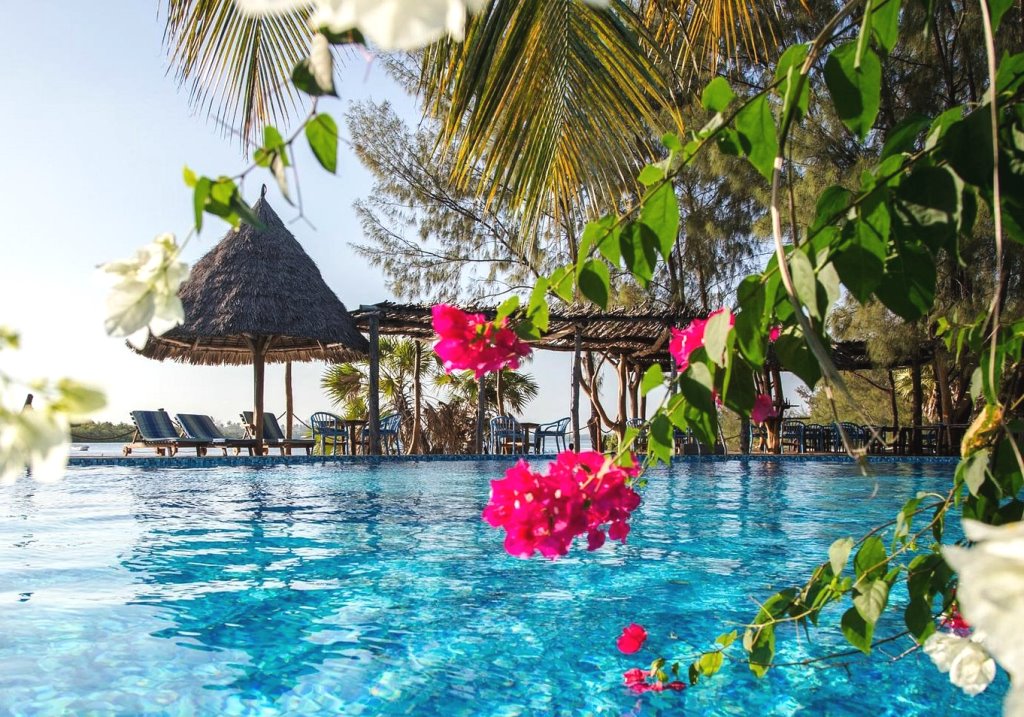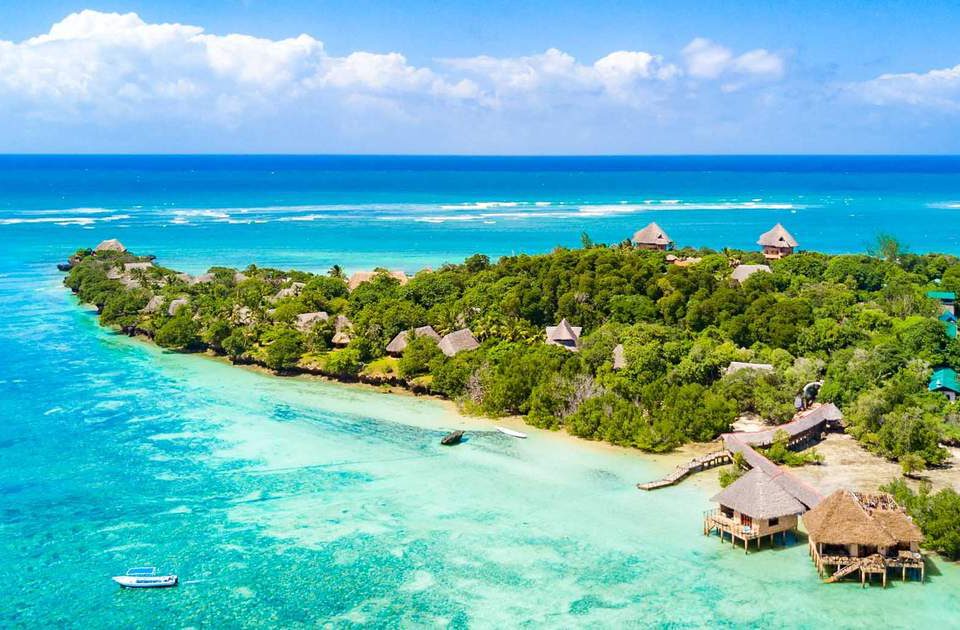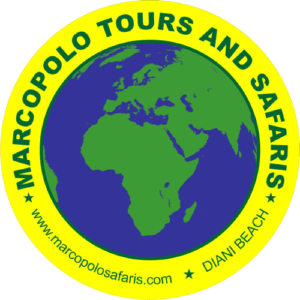Introduction to Funzi Island
Imagine a place where time slows down, where turquoise waters kiss white sandy beaches, and where the silence is broken only by the gentle splash of waves and the calls of seabirds. That place is Funzi Island, a little-known gem along Kenya’s southern coast. Far from the crowds of Diani Beach or the bustling city of Mombasa, Funzi Island offers tranquility, untouched nature, and a cultural experience rooted in centuries of Swahili tradition.
Where is Funzi Island Located?
Funzi Island lies in Kwale County, about 35 kilometers south of Diani Beach and 70 kilometers from Mombasa. It sits along the Indian Ocean, surrounded by mangrove forests and estuarine waters. Accessible only by boat, the island feels like a world away from the mainland, making it an ideal retreat for those seeking peace and exclusivity.
Why Funzi Island Stands Out
Unlike other popular coastal destinations, Funzi Island is not commercialized or crowded. It is home to a small fishing community, mangrove-lined waterways, and some of the best turtle nesting beaches in Kenya. Tourists visit not just for relaxation but for unique experiences such as dhow sailing, canoe rides through mangroves, and picnics on shifting sandbanks that appear and disappear with the tides. The island is also known for its eco-tourism efforts, which combine conservation with community development.
History and Cultural Heritage of Funzi Island
Funzi Island is more than just a scenic escape—it has a rich history and cultural identity deeply tied to the Swahili Coast.
Early Inhabitants and Swahili Culture
The history of Funzi Island dates back centuries, with early settlers being part of the larger Swahili culture that thrived along East Africa’s coast. These communities were influenced by Arab, Persian, and Indian traders who established trade routes across the Indian Ocean. Funzi’s strategic location made it a hub for fishing, trade, and cultural exchanges. Over time, the blend of African and Arab traditions shaped the Swahili language, architecture, and customs that are still evident on the island today.
Traditions of the Shirazi People
The island is predominantly inhabited by the Shirazi people, a Swahili subgroup believed to be descendants of Persian settlers who intermarried with local communities. The Shirazi culture is reflected in Funzi’s traditional wooden dhows, Islamic-influenced architecture, and seafood-based cuisine. Visitors to Funzi can still witness age-old traditions like dhow building, net fishing, and cultural ceremonies that connect the community to its historical roots.
Geography and Landscape of Funzi Island
Funzi Island is a geographical wonder, combining oceanic beauty with unique ecosystems that are rare to find elsewhere.
The Island’s Unique Coastal Topography
The island is relatively small but diverse in landscape. Its shoreline is fringed with mangroves, sandy beaches, and shallow lagoons. During low tide, vast sandbanks emerge from the sea, creating natural “floating islands” where visitors can enjoy private picnics. These sandbanks are one of Funzi’s most iconic features, offering unmatched views of the ocean and the sky.
The Funzi Creek and Sandbanks
Funzi Creek is a tidal estuary that surrounds the island, filled with channels and lagoons lined by mangroves. This creek is best explored on a canoe safari, where travelers glide through calm waters and observe rich marine and bird life. The sandbanks, which emerge with the tides, are a unique natural attraction. Tour operators often organize excursions to these sandbanks, complete with seafood feasts and relaxation under makeshift tents.
Mangrove Forest Ecosystem
The mangrove forests of Funzi Island are among the most important ecosystems on the Kenyan coast. They provide a breeding ground for fish, protect the shoreline from erosion, and act as a buffer against storms and rising sea levels. They are also home to countless birds, crabs, and other marine life. For nature lovers, exploring these mangroves by canoe is an unforgettable experience.
Marine Life and Wildlife at Funzi Island
Funzi Island is a paradise for marine enthusiasts and wildlife lovers, offering rare encounters with sea turtles, dolphins, and exotic birds.
Sea Turtles and Their Nesting Grounds
One of the most significant attractions of Funzi Island is its role as a nesting ground for sea turtles, particularly the green turtle and hawksbill turtle. Conservation groups and locals work together to protect turtle nests from poaching and ensure hatchlings make it safely to the ocean. Tourists can sometimes witness baby turtles being released into the sea, a magical and emotional experience that connects people directly with nature.
Dolphins and Marine Adventures
The waters around Funzi Island are home to playful dolphins, often spotted during dhow or canoe safaris. Watching dolphins leap and swim alongside traditional dhows is a highlight for many visitors. In addition, the nearby coral reefs provide excellent opportunities for snorkeling, where travelers can discover colorful fish and vibrant underwater ecosystems.
Bird Species and Estuary Wildlife
Birdwatchers will find Funzi Island rewarding, as the mangroves and creeks host species like herons, kingfishers, and fish eagles. The estuarine environment also supports mudskippers, crabs, and crocodiles, making it an exciting location for wildlife observation. The blend of marine and forest ecosystems makes Funzi Island unique among Kenya’s coastal attractions.
Activities to Do at Funzi Island
A trip to Funzi Island is not about nightlife or crowds—it’s about embracing nature and culture through simple yet enriching activities.
Traditional Dhow Safaris
Exploring the waters around Funzi on a traditional dhow is like stepping back in time. These wooden boats, handcrafted by local artisans, sail quietly through the creeks and lagoons, giving travelers a taste of Swahili maritime history. Dhow safaris often include stops at sandbanks, village visits, and seafood lunches, making them a well-rounded cultural and nature experience.
Canoe Rides in the Mangroves
Canoeing through the mangrove channels of Funzi Creek is one of the island’s signature activities. These calm rides allow visitors to observe birdlife, spot crocodiles, and learn about the importance of mangrove ecosystems. Guided by locals, canoe safaris are both relaxing and educational.
Sandbank Picnics and Swimming
Perhaps the most magical activity on Funzi Island is enjoying a private picnic on a sandbank surrounded by the ocean. As the tide recedes, pristine white sands appear like a hidden island. Tour operators set up tables, chairs, and even shade for visitors, who can then swim, sunbathe, or simply marvel at the beauty of the ocean.

Local Culture and Community at Funzi Island
Funzi Island is not just about scenery—it’s a living cultural landscape shaped by centuries of Swahili heritage and the daily lives of its people.
Lifestyle of the Islanders
The island’s population is small, with most residents engaged in fishing, small-scale farming, and eco-tourism activities. Life here moves at a slower pace, guided by the tides and the rhythms of nature. Villages are simple, with coral stone houses and palm-thatched roofs. Islanders are welcoming and often eager to share their way of life with visitors, whether through storytelling, guided tours, or inviting guests to experience a day of fishing with them.
Local Cuisine and Seafood Delicacies
Food on Funzi Island reflects its maritime culture. Fresh seafood dominates the menu—grilled fish, prawns, lobster, and crab are served with coconut rice, cassava, and chapati. Spices like cardamom, cloves, and cinnamon, borrowed from centuries of Indian Ocean trade, add flavor to dishes. For many visitors, enjoying a freshly caught seafood platter on the beach or during a dhow safari is a highlight of their trip.
Handicrafts and Cultural Experiences
The islanders are skilled in crafting traditional dhows, woven mats, and beadwork. Tourists can buy souvenirs directly from local artisans, ensuring that their purchases support the community. Visitors also have the chance to witness cultural dances, Swahili poetry (known as utendi), and local ceremonies that celebrate Funzi’s heritage. These experiences make the island more than a beach destination—it’s a window into authentic coastal life.
Tourist Attractions Near Funzi Island
Though Funzi itself is captivating, nearby attractions add variety to the travel experience.
Shimba Hills National Reserve
Just inland from Funzi, Shimba Hills offers a completely different adventure—lush forests, elephants, and the rare sable antelope. Visitors often combine a day safari in Shimba Hills with a relaxing coastal trip to Funzi, experiencing both wildlife and marine beauty in one journey.
Diani Beach Excursions
Diani Beach is one of Kenya’s most famous beaches, with soft white sands and vibrant nightlife. For travelers based in Diani, a day trip to Funzi Island offers the perfect contrast—where Diani is lively and buzzing, Funzi is quiet and untouched.
Kisite-Mpunguti Marine Park
For snorkelers and divers, this marine park is paradise. Located not far from Funzi, it boasts coral reefs teeming with colorful fish, dolphins, and even whales at certain times of the year. A trip here can easily be combined with a dhow safari from Funzi Island.
Accommodation Options on Funzi Island
Despite its secluded nature, Funzi Island has options for every type of traveler, from luxury seekers to budget explorers.
Funzi Keys Resort
This is the most famous accommodation on the island, known for its rustic luxury. The resort offers beachfront cottages, infinity pools overlooking the ocean, and personalized services such as private sandbank dinners. It is designed for travelers seeking exclusivity and comfort in a serene environment.
Guesthouses and Budget Stays
For budget-conscious travelers, simple guesthouses and homestays are available. These provide an authentic experience, allowing visitors to live close to the local community. While facilities may be basic, the warmth of the hosts and the immersion in island life make them worthwhile.
Eco-Lodges and Sustainable Tourism
Several eco-lodges around Funzi Island focus on sustainable tourism, blending comfort with conservation. These lodges use solar power, harvest rainwater, and support community initiatives such as turtle conservation. Staying in an eco-lodge allows visitors to enjoy the island while minimizing their ecological footprint.
How to Get to Funzi Island
Part of the charm of Funzi Island is that it isn’t accessible by road—you have to cross the waters to reach it.
From Mombasa
Funzi Island is about 70 kilometers from Mombasa. Travelers can drive south along the coastal highway towards the Ramisi River, then take a boat across to the island. The journey by road takes around two hours.
From Diani Beach
From Diani, the island is just 35 kilometers away. Many tour companies offer package trips that include road transport, boat rides, and guided tours of Funzi Creek and the sandbanks. This makes it convenient for beach holidaymakers to add a cultural and natural twist to their vacation.
Boat Transfers and Access Routes
The only way to reach Funzi is by boat. Traditional dhows and motorized boats ferry visitors across the creek in just 15–20 minutes. The boat ride itself is part of the adventure, passing through mangroves and calm tidal waters.
Best Time to Visit Funzi Island
Like most coastal destinations, the timing of your visit can greatly influence your experience.
Weather and Seasonal Considerations
The island has a tropical climate, with temperatures ranging between 25°C and 32°C year-round. The long rainy season runs from April to June, while the short rains fall in October and November. The dry months—July to September and December to March—are the best for outdoor activities, dhow safaris, and turtle watching.
Peak and Low Tourist Seasons
Tourism peaks during the dry season, especially around December when beach holidays are popular. Visiting in the off-season has advantages, such as fewer tourists, lower rates, and lush landscapes after the rains. However, heavy rains can make boat transfers and sandbank picnics less predictable.
Conservation Efforts in Funzi Island
Preserving Funzi’s natural environment is crucial, as the island depends on its fragile ecosystems for survival.
Protecting Marine Life and Turtles
Sea turtles are at the heart of conservation efforts. Local groups and NGOs work tirelessly to monitor nesting beaches, relocate endangered nests, and educate communities about the importance of turtle survival. These efforts have seen increasing numbers of hatchlings safely reaching the ocean.
Community-Based Conservation Projects
Islanders play an active role in protecting their environment. From mangrove replanting programs to eco-tourism initiatives, the community has embraced sustainable practices. For instance, dhow safari operators often include educational talks on conservation, ensuring visitors leave with more than just memories—they leave with awareness.
Travel Tips for Funzi Island Visitors
Visiting Funzi Island is an unforgettable experience, but being prepared ensures your trip is smooth, safe, and deeply rewarding.
What to Pack for the Island
Since Funzi Island is rustic and remote, packing the right essentials is key:
Light clothing suitable for the tropical climate. Cotton and linen fabrics are best.
Swimwear for enjoying the sandbanks and ocean swims.
Waterproof sandals or flip-flops, since you’ll be wading in shallow waters during dhow safaris or sandbank visits.
Sun protection: a wide-brimmed hat, sunglasses, and high-SPF sunscreen are a must.
Insect repellent to protect against mosquitoes, especially in the evenings.
Reusable water bottle, as staying hydrated in the coastal heat is essential.
Camera or smartphone, because the sandbanks, mangroves, and sunsets are simply too magical not to capture.
Safety and Responsible Tourism
Always use a certified tour operator for dhow or canoe safaris—this ensures safety and supports local livelihoods.
Respect cultural traditions: dress modestly when visiting villages and ask before taking photos of residents.
Avoid littering, especially plastic waste, as it harms marine life. Carry back all your trash.
Support conservation by choosing eco-lodges and buying locally made crafts instead of imported souvenirs.
Be mindful of tides—sandbanks can disappear quickly, so never wander off without a guide.
Funzi Island vs. Other Coastal Destinations
With Kenya’s coastline dotted with gems like Lamu, Watamu, and Zanzibar just across the waters in Tanzania, travelers often wonder how Funzi Island compares.
Comparison with Lamu and Zanzibar
Lamu is steeped in Swahili history and has a lively cultural scene with centuries-old architecture, but it’s more developed and busier than Funzi.
Zanzibar is world-famous for its beaches, spice farms, and resorts, but with fame comes crowds and commercialization.
Funzi Island, on the other hand, is intimate, quiet, and unspoiled. It lacks the grandeur of Zanzibar’s Stone Town or Lamu’s historic allure, but it offers a rare sense of seclusion and raw natural beauty.
Why Choose Funzi for a Getaway
If your dream vacation is about escaping crowds, immersing yourself in nature, and experiencing authentic Swahili culture, Funzi is the perfect choice. It’s a place where simplicity becomes luxury—where a canoe ride through mangroves or a seafood meal on a sandbank is more enriching than any five-star hotel buffet.
Economic Importance of Funzi Island
Though small, Funzi Island plays an important role in supporting local livelihoods and regional development.
Tourism and Local Livelihoods
Eco-tourism is the island’s main economic driver. Tour operators, dhow builders, guides, and lodge staff all rely on tourism for income. Visitors help sustain schools, health services, and conservation projects by spending money on local tours, food, and crafts. This model ensures that tourism directly benefits residents rather than just outside investors.
Fishing and Traditional Practices
Fishing has always been the backbone of the island’s economy. Islanders catch fish, prawns, and crabs both for personal consumption and for sale in mainland markets. Traditional fishing practices—using dhows, nets, and hand lines—are still common, although modern challenges such as overfishing and climate change have made sustainability more critical than ever.
Challenges Facing Funzi Island
Like many coastal communities, Funzi faces environmental and economic challenges that threaten its future.
Climate Change and Rising Sea Levels
Rising sea levels pose a real risk to the island, which is low-lying and surrounded by tidal waters. Erosion of beaches and mangrove destruction are visible effects of climate change. Stronger storms and unpredictable weather patterns also affect fishing and tourism.
Overfishing and Marine Degradation
Overfishing in surrounding waters has reduced fish stocks, threatening both livelihoods and food security. Unsustainable fishing methods, such as using small-mesh nets, also disrupt marine ecosystems. Efforts are being made to promote sustainable fishing practices, but challenges remain.
The Future of Funzi Island
Despite the hurdles, the future of Funzi Island is bright if conservation and sustainable tourism continue to grow.
Eco-Tourism Potential
Funzi is increasingly being recognized as an eco-tourism hotspot. With proper investment in infrastructure, community training, and conservation programs, it could attract more responsible travelers seeking authentic and nature-based experiences. Small-scale lodges and guided tours that emphasize sustainability will likely shape its future.
Preserving Swahili Coastal Heritage
Beyond its natural beauty, Funzi holds cultural importance as part of the Swahili Coast. Preserving its language, traditions, and crafts alongside its environment ensures that tourism benefits go hand in hand with cultural pride. Local leaders are already integrating cultural tourism into visitor experiences, making Funzi a living museum of Swahili heritage.
Conclusion
Funzi Island is not a place for those seeking nightlife or bustling crowds—it’s for those who want to connect with nature, culture, and themselves. With its mangrove creeks, turtle nesting beaches, shifting sandbanks, and welcoming community, Funzi offers something rare in today’s world: authenticity. Whether you arrive on a dhow safari, explore the mangroves in a canoe, or feast on fresh seafood by the ocean, Funzi leaves you with memories that linger long after you’ve left. It is more than a destination—it’s an experience of harmony between people, culture, and the sea.
FAQs
1. How do I reach Funzi Island from Diani?
You can drive south from Diani to Ramisi, then take a short boat ride to Funzi Island. Tour operators arrange full-day excursions.
2. What is Funzi Island famous for?
The island is best known for its mangrove creeks, sea turtle nesting beaches, sandbank picnics, and dhow safaris.
3. Can I stay overnight on Funzi Island?
Yes, accommodations range from luxury resorts like Funzi Keys to simple guesthouses and eco-lodges.
4. Is Funzi Island good for snorkeling or diving?
While Funzi itself has calm estuarine waters, nearby Kisite-Mpunguti Marine Park offers excellent snorkeling and diving opportunities.
5. When is the best time to see turtles on Funzi Island?
Turtle nesting season peaks between June and September, though hatchlings may be seen at different times depending on tides and weather.







